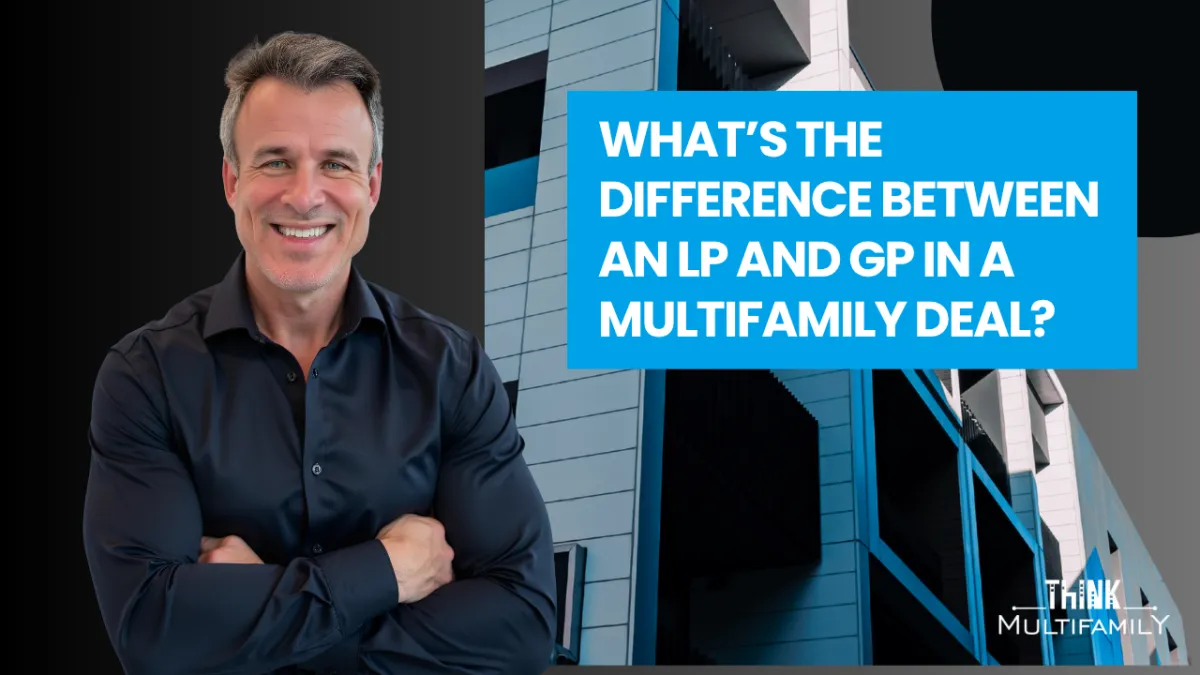
🎯 What’s the Difference Between an LP and GP in a Multifamily Deal?
By Mark Kenney | Think Multifamily
If you're exploring multifamily real estate investing, chances are you've run across two letters that pop up in every deal breakdown: LP and GP.
Maybe you're wondering:
→ “Which one should I be?”
→ “What’s the risk for each?”
→ “How do they make money?”
→ “Can I be both?”
This blog breaks it all down — clearly, concisely, and without the fluff. Because whether you're looking to go all-in or invest passively, understanding these roles is foundational to success in apartment syndication.
🧩 LP vs GP: The Basics
Let’s keep it simple:
GP = General Partner (a.k.a. the “active” partner, syndicator, or operator)
LP = Limited Partner (a.k.a. the “passive” investor or capital partner)
Both roles are essential. One brings the experience, sweat, and strategy. The other brings the capital.
It’s not a hierarchy — it’s a partnership. But the roles, responsibilities, and risks are very different.
⚙️ What Does a General Partner (GP) Do?
The GP is the quarterback of the deal.
They’re responsible for:
🔍 Finding the deal
📊 Underwriting and making sure the numbers make sense
🧾 Securing financing and signing on the loan
💸 Raising capital from LPs
🧠 Creating the business plan
🛠️ Managing the asset
📣 Communicating with investors
🚪 Executing the exit strategy and selling the property
The GP team (often an LLC or group of partners) essentially runs the deal from start to finish.
💰 How GPs Get Paid:
Acquisition fee (2–5% of purchase price)
Asset management fee of Revenue collected (1–2% annually)
Equity split of profits at the end (commonly 70/30 or 80/20 LP/GP)
Disposition or refinance fees, if structured into the deal
💼 What Does a Limited Partner (LP) Do?
The LP is the capital partner who invests their money into the deal and lets the GP handle the rest.
They’re not involved in:
Deal selection
Operations
Limited decision-making
Property management
Instead, they enjoy truly passive investing — and earn a portion of profits based on the size of their investment.
💰 How LPs Make Money:
Preferred return (commonly 6–10% annually)
Profit split from cash flow and capital gains
Depreciation and tax benefits
This role is ideal for busy professionals, retirees, or anyone who wants real estate cash flow without being a landlord.
🤝 GP vs LP: Key Differences

🛑 Wait — Can I Be Both?
Yes! In fact, many GPs start as LPs first.
They get familiar with syndications, build confidence, and later transition to the active side. Some GPs also invest their own money as LPs in the same deal to show alignment and skin in the game.
You don’t have to choose one forever. Your role can evolve as your experience, capital, and goals grow.
💡 How to Know Which Role is Right for You
Ask yourself:
⏱️ "Do I have time to be actively involved?"
🧠 "Do I want to learn the operations side of real estate?"
💰 "Do I have capital I want to invest passively?"
🧍♂️ "Am I looking for cash flow, equity, or both?"
Choose GP if: You want to be hands-on, lead deals, build a business.
Choose LP if: You want cash flow and equity without the day-to-day grind.
👉 Want to dive deeper? Be sure to check out our Ultimate Guide to Multifamily Investing — your complete roadmap to building wealth through apartment deals.
🧭 Think Multifamily’s Approach
At Think Multifamily, we specialize in partnering with passive investors who want to build long-term wealth without becoming full-time real estate operators.
But we also coach and mentor GPs who are ready to lead syndications themselves — and want real guidance from someone who’s closed over 120+ multifamily deals.
✉️ Ready to Take the Next Step?
🟦 Grab our free guide to get started with confidence
🟦 Dive into the $7 Fast-Track System and follow a proven process
🟦 Click Here For: Multifamily Syndication Coaching for Real Estate Investors
You don’t need to know it all today — you just need to know the difference between sitting on the sidelines or stepping into wealth-building roles that change your life.